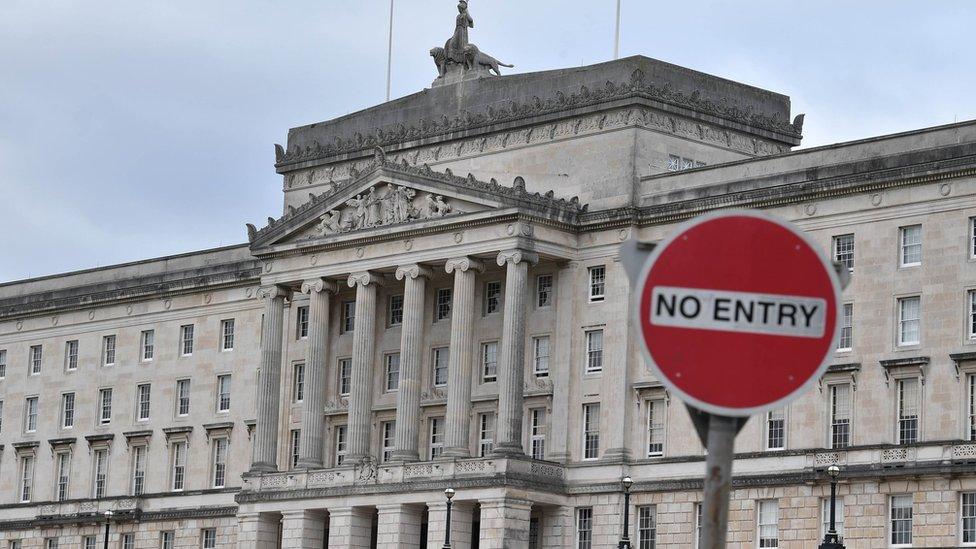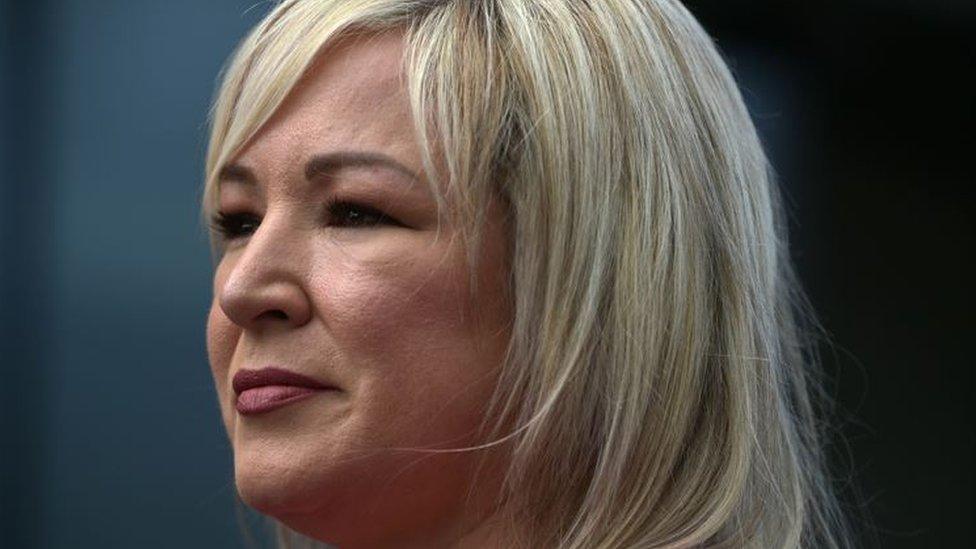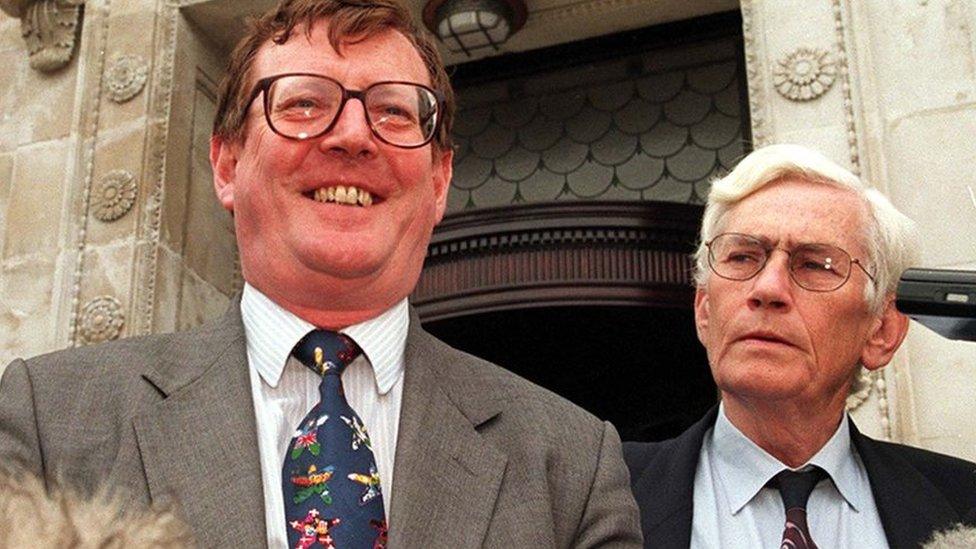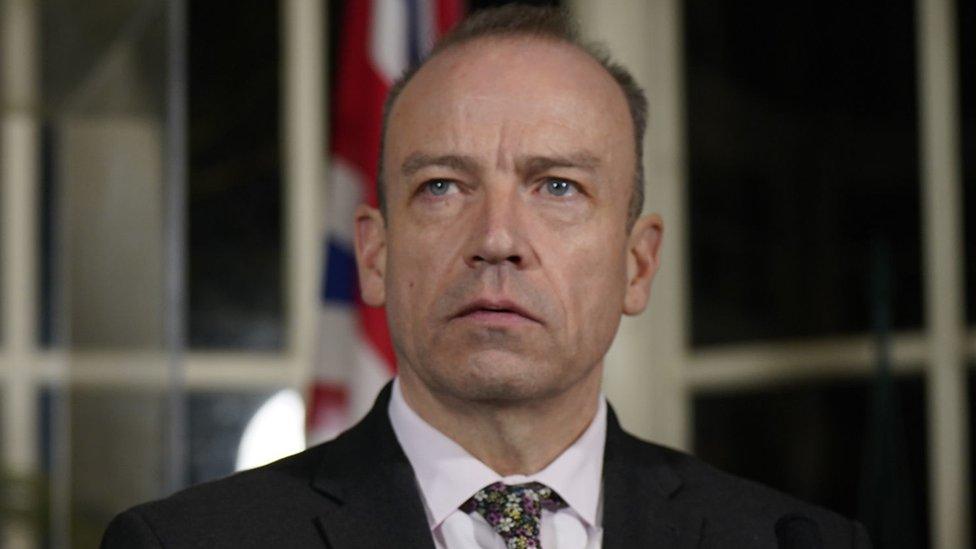Stormont leaders 'should be joint first ministers' - Westminster committee
- Published
- comments

The DUP has blocked power sharing at Stormont since February 2022
Stormont's first and deputy first ministers should be renamed joint first ministers, a Westminster committee has said.
The proposal is part of a report by the Northern Ireland Affairs Committee, external into power-sharing government.
The Democratic Unionist Party (DUP) has said it has "grave concerns" about the recommended reforms.
But Sinn Féin said it was time to learn lessons from what has and has not worked since the Good Friday Agreement.
The committee made the recommendations following an inquiry into the effectiveness of the institutions.
Northern Ireland has been without a government for 21 months.
This is due to the DUP's protest against post-Brexit trade rules.
What does the report say?
The committee published a report that runs to 100 pages, which sets out areas it believes should be reformed to improve political stability in Northern Ireland.
It argues that one of those changes should be to rebrand the first and deputy first ministers to "joint first ministers".
The titles were first agreed through the 1998 Good Friday Agreement, the peace deal that helped to largely end decades of conflict known as the Troubles and created the structures for modern power sharing. , external
Although the titles are different. both offices hold equal weight and one minister cannot act without the other.
Nationalist party Sinn Féin won the most seats in last year's assembly election, entitling it to the first minister position for the first time.
But it cannot do so without the support of the DUP which, as the largest unionist party, is entitled to nominate the deputy first minister role.
The committee said that "there is no justifiable reason" why the titles should not be formally known as "joint first ministers".
It has called on the government to consult with the Northern Ireland parties about the proposal and legislate for it to take effect for the start of the next assembly mandate.

Michelle O'Neill is entitled to hold the first minister position, as deputy leader of Sinn Fein
The SDLP has previously advocated for this change while Alliance has also suggested a number of reforms to how Stormont operates.
The committee added: "An accurate representation of the jointness of the offices would, 25 years on, reinforce the agreement's principle of parity of esteem between the two main communities and send a signal that the Executive Office acts in the interests of them both.
"This could begin to restore faith in the institutions at a time of crisis."
The committee's report also recommends changing how the Northern Ireland Assembly's speaker is elected.
At present, it requires a majority of both unionists and nationalist assembly members in order to pass.
What have the DUP and Sinn Féin said?
The DUP MP Carla Lockhart, who sits on the committee, said she has "grave concerns" about the recommendations made.
Speaking to Good Morning Ulster, Ms Lockhart said the DUP had opposed the report.
"The last 25 years couldn't have happened without inbuilt protections for both unionists and nationalists and this report is just trying to set that aside.
"It's trying to undermine that fact that unionism does not support what the government has done in recent months around the protocol and the Windsor Framework," she added.
"We want to get back to consensus politics and we don't believe that any sweeping new ways of working should be introduced to Northern Ireland and the assembly at this time."
However a Sinn Féin spokesperson said that "25 years since the Good Friday Agreement, it's imperative to learn lessons around what has worked, but also what hasn't".
The party said the DUP's "current blockade" was "unfair on all those people who voted for real change last May, and in recent council elections, and who voted for parties to work together to deliver for all our people."
The spokesperson said the outcome of the elections needed to be "respected and the Executive established without delay."
"This would enable the assembly and Executive Review Committee set up under the Good Friday Agreement to do its work."
What have the other NI parties said?
UUP leader Doug Beattie said any changes to governance must be put before the people of Northern Ireland first.
"Our party have always called for a 'factory reset' to the settings of the Belfast Agreement - any changes to the process of governing must be put before the people of Northern Ireland.
"The principle of consent needs to be at the heart of any change."
SDLP MP Claire Hanna said she believed there was an "appetite" for the proposals and help Stormont "get away from being manifested in deadlock and veto and division".
"Perhaps if parties saw the show will go on without them and they don't get to prevent all democratic oversight, they will want to join in," she added.
Alliance MP Stephen Farry emphasised that it was important that the Good Friday Agreement "evolves with changing circumstances".
"No one is in power at the moment because the system isn't working and when it was working in the past it was so prone to collapse that the institutions only worked for about 60% of the time.
"We have to get away from the situation where certain traditions in Northern Ireland have access to power by right," he added.
Since last May's election, several attempts to elect a new speaker and allow the assembly to operate have failed because the DUP has withheld support.
It has said it will not return to the institutions until it reaches a deal with Number 10 around more changes to post-Brexit trade rules that apply in Northern Ireland.
The committee said the speaker should instead be elected by a two-thirds supermajority of Stormont's 90 assembly members, and that this change should happen "as soon as practicable".
"Stable and effective government is perhaps needed more than ever. The ability of the assembly to elect a speaker is fundamental to this and we see it as a priority that the assembly has a speaker in place as soon as possible," it added.
A Northern Ireland Office (NIO) spokesman said the government was "fully focused on getting the executive back up and running as soon as possible."
"While we continue to listen to the conversation around how we can ensure we have effective and enduring political institutions, any changes to the makeup of the assembly would require widespread support across Northern Ireland," he added.
'Roadmap for reform'
The committee has also recommended that elections of joint first ministers should be open to any party - rather than just the two largest parties - and also be elected by a two-thirds majority of MLAs, instead of the current system requiring a majority of both unionists and nationalists.
Committee chair Sir Robert Buckland said that MPs had proposed short-term measures aimed at improving devolution.

Sir Robert Buckland is the new chair of the Northern Ireland Affairs Committee
"More stringent safeguards are needed to protect against the cycle of restoration and collapse that has dogged Stormont," he said.
"The short-term measures we've proposed will shore up the stability of Stormont increasing the incentives to keep the institutions moving and enabling the assembly to run without an executive in place."
The report also stated that the UK government should commission a formal and independent review of the institutions, which would look at all three strands of the Good Friday Agreement and set out a "defined roadmap" for reform.
It added that the government should start preparations for a citizens' assembly in Northern Ireland, allowing members of the public to be consulted about Stormont's effectiveness and suggest how to reform it.
Related topics
- Published15 May 2022

- Published28 November 2023

- Published17 October 2023
